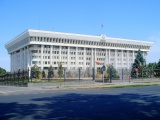Washington Wary of New Kyrgyz Leaders
By Deirdre Tynan for ISN
As southern Kyrgyzstan continues to smolder, the country’s provisional government is thinking about opening a new income stream. Provisional leaders are seeking to slap a value-added tax of 12 percent, plus excise duties, on fuel imports destined for the Manas Transit Center.
Under an agreement negotiated in 2009 the United States and its contractors are exempt from paying Kyrgyz duties and taxes on fuel imports for Manas. However, in late May, Bishkek unilaterally tried to impose an import tax, causing a brief disruption in operations at Manas, a key logistics hub for the US and NATO war effort in Afghanistan. Ultimately, the new tax was suspended until at least June 20, allowing time for new negotiations.
From the provisional government’s viewpoint, the tax question is a matter of fairness. About 12 million gallons of TS-1 Russian grade jet fuel are consumed every month at Manas.
“For the past 10-years they haven’t paid any taxes and the state budget has lost a lot of money because of that,” said Bazarbai Mambetov, the head of the Oil Traders Association and the provisional government’s newly appointed national coordinator for matters relating to the Eurasian Economic Community and the Commonwealth of Independent States.
“The interim government thinks this is the way it should be, but we don’t know yet if they will succeed in imposing the new tariffs,” Mambetov added.
American officials see the Kyrgyz tax ploy more as a shakedown attempt, according to some observers with detailed knowledge of the Manas fuel-supply saga. US resistance to any new tax regime for Manas fuel imports has been stiff, sources told Eurasianet.org. And in both the Pentagon and the State Department there is a growing, general sense of “weariness and wariness” of the provisional government in Bishkek, one observer added.
Heightening concerns about the dependability of Kyrgyz provisional leaders, chief prosecutor Azimbek Beknazarov said June 16 that Manas’ future could be linked to the extradition of Maxim Bakiyev, the son of the former president, from the United Kingdom, where he has reportedly sought asylum.
“If they refuse [our request to extradite him], we will ask them to take away their airplanes from the Manas Transit Center,” Beknazarov said. Six Kyrgyz fuel companies allegedly controlled by Maxim Bakiyev are currently under investigation in Bishkek on suspicion of Manas-related fraud.
In early April, shortly before mass protests caused the collapse of former president Kurmanbek Bakiyev’s administration and swept the provisional government into power, Russia imposed punitive duties on Kyrgyz fuel imports. Some observers saw the move as a sign of the Kremlin’s extreme displeasure over abuses connected with Manas fuel supplies, including the alleged re-export of Manas-bound fuel to Afghanistan. Most of the fuel supplied to Manas comes originally from Russia.

